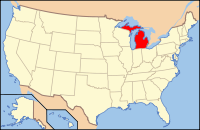Branch County
| Branch County, Michigan | ||
|---|---|---|
|
||
 Location in the U.S. state of Michigan |
||
 Michigan's location in the U.S. |
||
| Founded | October 29, 1829 (created) 1833 (organized) |
|
| Named for | John Branch | |
| Seat | Coldwater | |
| Largest city | Coldwater | |
| Area | ||
| • Total | 520 sq mi (1,347 km2) | |
| • Land | 506 sq mi (1,311 km2) | |
| • Water | 13 sq mi (34 km2), 2.6% | |
| Population | ||
| • (2010) | 45,248 | |
| • Density | 89/sq mi (34/km²) | |
| Congressional district | 7th | |
| Time zone | Eastern: UTC-5/-4 | |
| Website | co |
|
Branch County is a county in the U.S. state of Michigan. As of the 2010 census, the population was 45,248. The county seat is Coldwater. As one of the "cabinet counties" it was named for the U.S. Secretary of the Navy John Branch under President Andrew Jackson. The county was founded in 1829 and organized in 1833.
Branch County comprises the Coldwater, MI Micropolitan Statistical Area.
Branch County was a New England settlement. The original founders of Coldwater consisted entirely of settlers from New England. These people were "Yankees", that is to say they were descended from the English Puritans who settled New England in the 1600s and carried their culture with them. During the early 1800s, these settlers were part of a wave of New England farmers who headed west into what was then the wilds of the Northwest Territory. Many traveled through New York State via the Erie Canal; the threat of Native Americans had been reduced by the end of the Black Hawk War. When they arrived in what is now Branch County, they found virgin forest and wild prairie.
The Yankees laid out farms, constructed roads, erected government buildings, and established post routes. They brought many of their New England values, such as a passion for education, and established many schools. Many were supporters of abolitionism. They were mostly members of the Congregationalist Church though some were Episcopalian. Culturally Branch County, like much of Michigan, developed as part of the Northern Tier, continuous with New England culture, for most of its history. The county depends on agriculture as the basis of its economy.
...
Wikipedia

